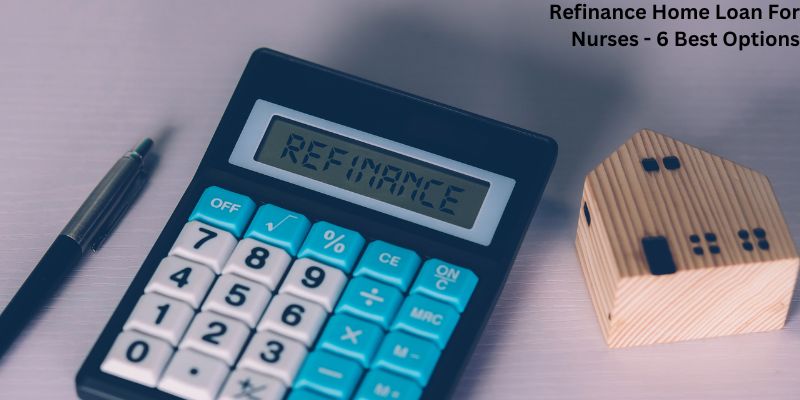Blog
Refinance Home Loan For Nurses – 6 Best Options For Your Reference
Generate Your About Us Content
Are you a nurse looking to make a smart financial decision? Look no further! In this blog post, perfumetowns.com will help you explore an important topic that can have a significant impact on your financial future – Refinance home loan for nurses. Whether you’re a seasoned homeowner or a first-time buyer, understanding the benefits and considerations of refinancing can help you make an informed decision. So, if you’re ready to take control of your finances and explore the world of home loan refinancing, keep reading.
1. Refinance Home Loan For Nurses – Do nurses qualify for house loans?

Yes, there are several nurse-specific house loans available. Additionally, a lot of regional and federal aid programs can help nurses and other healthcare workers with down payment and closing fees. especially if they are purchasing their first property.
2. Refinance Home Loan For Nurses – 6 Best Options
2.1 Program Nurse Next Door – Refinance home loan for nurses
A “true” mortgage loan program does not exist with the Nurse Next Door initiative. It doesn’t make loans or lend money. Instead, it’s a home buyer assistance program that will assist you in finding the appropriate home, mortgage, and aid program for your requirements (if any).
When available, Nurse Next Door offers grants to nurses up to $8,000 and up to $10,681 in down payment aid. By forgoing a property evaluation and other expenses, you can also lower closing costs.
Remember that subsidies are often only given to first-time purchasers who are nurses or other members of the medical profession who are acquiring a main house. This implies that you cannot use the money to purchase a vacation house or investment property.
Check to see if your state or local down payment aid program doesn’t offer grants or loans that are more generous before using this program.
2.2 Healthcare professionals are Homes for Heroes – Refinance home loan for nurses

Another national homeowner aid program, Homes for Heroes, promises to lower the cost of home ownership for military, law enforcement, teachers, firemen, and medical professions.
Most people save at least $3,000 when they purchase or sell a property with us, according to the website. The discounts are far more than what you’ll receive from other national programs when you total up savings from property agents, loan officers, title firms, house inspectors, and other routine transactions.
Be aware that in order to benefit, you must utilize the real estate agents that Homes for Heroes recommends. Again, be sure this is the best option before purchasing by comparing it to other area programs.
2.3 Conventional nursing loans – Refinance home loan for nurses
The most prevalent sort of house loan accessible today is a conventional mortgage. Like the other loans on this list, these loans are not guaranteed by the government, but the majority of them abide by the regulations set out by government-supported companies Fannie Mae and Freddie Mac. Because of this, they are also known as “conforming loans.”
For conventional loans, a credit score of 620 or above is necessary. But to qualify, they have a low down payment option that only requires 3% of the buying price. However, you’ll have to pay for personal mortgage insurance (PMI), which results in higher monthly payments, if the amount you put down is less than 20%.
2.4 FHA – Refinance home loan for nurses

A mortgage sponsored by the Federal Housing Administration, or an FHA loan, can be an option for nurses and other medical professionals with credit scores between 580 and 620. Due to its lax approval criteria, this sort of loan is well-liked among first-time home purchasers.
3.5% down payments are also a possibility for FHA loans. But for the duration of the loan, you will be required to pay mortgage insurance charges (MIP). MIP is not the same as private mortgage insurance on a traditional loan, it should be noted. Even yet, as their credit scores rise, many FHA buyers simply refinance to avoid paying mortgage insurance in the future.
If you can, think about choosing a conforming loan. Because you can more simply and affordably avoid paying for mortgage insurance with those.
2.5 VA loans for nurses
A VA loan, supported by the Department of Veterans Affairs, is an option for nurses who have served in the military or are currently doing so. If you qualify, this is probably your best option.
The standard range for credit score thresholds imposed by lenders is between 580 and 660. But there is no deposit required. Additionally, you’ll be eligible for minimal closing fees, no private mortgage insurance, and an interest rate below the market.
A one-time VA financing charge, which normally ranges between 2.3% and 3.6% of the loan amount, is required of VA buyers. Many borrowers, however, add this cost to their loan debt rather than paying it up front.
2.6 USDA loans for nurses
The USDA mortgages are backed by the US Department of Agriculture. These also don’t demand a deposit. However, you’ll probably require a score of 640 or more. A USDA mortgage usually provides lower interest rates than the “going” rate, similar to the VA loan.
You must also purchase a home in an approved rural location and fulfill income requirements for your household. There are several suburbs there. Check the maps provided by the USDA to see if the location you wish to purchase from is permitted.
